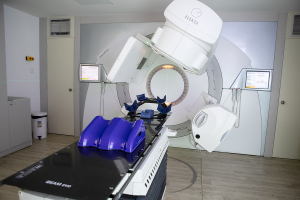CMS proposes alternative payment model for radiation oncology
por
John R. Fischer, Senior Reporter | July 17, 2019

CMS has proposed an alternative
payment model to support
radiation oncology procedures
The Centers for Medicare and Medicaid Services has proposed an advanced alternative payment model for providers administering radiation oncology procedures.
Aimed at supporting the transition toward value-based care, the Radiation Oncology (RO) Model encourages the adoption of prospective site-neutral, episode-based payments by physician group practices, hospital outpatient departments, and freestanding radiation therapy centers for radiotherapy. This model is expected to reduce Medicare expenditures, while maintaining or enhancing the quality of care for Medicare beneficiaries.
"The RO Model proposed by CMS is an encouraging step forward in modernizing how radiation oncology care is reimbursed under Medicare and ultimately improving outcomes for cancer patients," Dr. Brian Kavanagh, immediate past chair of ASTRO, told HCB News. "For example, the new model provides incentives for high-quality, more convenient radiation treatments and rewards concordance with evidence-based clinical guidelines. The model also has the potential to stabilize reimbursement in the long term and move the specialty from an antiquated fee-for-service payment structure to one based on quality and value."
The prospective episode-based payments would apply to the treatment of 17 types of different cancers, with providers receiving payments during a 90-day period of care. Potential savings in cost for RT services during this period would be assessed, as would the ability of episode payments to shorten dose courses, increase efficiency in care delivery, and provide higher value to Medicare beneficiaries. CMS expects it to save $260 million for Medicare in that time.
Specific payment amounts for each would be based on proposed national base rates, trend factors, adjustments for each participant’s case-mix, historical experience, and geographic location, and a discount factor by CMS. To ensure quality is being met, the model would determine payment based on reporting and performance on quality measures, clinical data reporting, and patient experiences. In addition, all participants would be required to take part in Core Based Statistical Areas (CBSAs) to test the efficiency of the model.
Kavanagh says ASTRO will support the RO model by prioritizing recommendations that meet long-standing payment reform objectives, including stable and fair payments accompanied by incentives for higher quality care and reduced costs. While impressed, he notes a number of concerns, including the ability of small practices to obtain the necessary resources to comply with the model, and recommends a smaller scale "pilot" phase-in to enable incremental improvements in "real time" and to identify unexpected operational challenges prior to widespread mandatory participation.
"ASTRO is currently analyzing the proposed model, and it will take several weeks before we have a clear picture of how the new structure and rollout will impact the nation's 4,500 radiation oncologists and the roughly one-million patients they treat with radiation therapy each year. There are areas where we have concern, however, and we are committed to working constructively with CMS and Congress to improve the model before its implementation."
The five-year model is projected to begin in Jan. or April 2020 and end in December 2024.
ASTRO is currently accepting feedback from its members on practices to ensure adjustment to changes in a short time frame, should a mandate to participate take place as early as January. It will submit comments and suggested solutions to CMS in September.
|
|
|
You Must Be Logged In To Post A Comment
|
